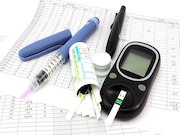Intervention improves HbA1c, diabetes-related QoL in young adults with low socioeconomic status
THURSDAY, Jan. 25, 2018 (HealthDay News) — A manualized occupational therapy (OT) intervention (Resilient, Empowered, Active Living with Diabetes [REAL Diabetes]) improves hemoglobin A1c in young adults with low socioeconomic status and type 1 or type 2 diabetes, according to a study published online Jan. 19 in Diabetes Care.
Elizabeth A. Pyatak, Ph.D., from the University of Southern California in Los Angeles, and colleagues randomized 81 ethnically diverse young adults with low socioeconomic status with type 1 or type 2 diabetes to the REAL Diabetes intervention group (IG) or an attention control group (CG) over six months. CG participants received standardized education material and biweekly phone calls, while IG participants received biweekly sessions guided by a manual, including seven content modules.
The researchers found that, compared with CG participants, IG participants exhibited significant improvement in hemoglobin A1c (−0.57 versus +0.36 percent; P = 0.01), diabetes-related quality of life (+0.7 versus +0.15; P = 0.04), and habit strength for checking blood glucose (+3.9 versus +1.7; P = 0.05). The effect was not modified significantly by sex, ethnicity, diabetes type, recruitment site, or socioeconomic status. There were no reports of study-related serious adverse events.
“The REAL Diabetes intervention improved blood glucose control and diabetes-related quality-of-life among a typically hard-to-reach population, thus providing evidence that a structured OT intervention may be beneficial in improving both clinical and psychosocial outcomes among individuals with diabetes,” the authors write.
Copyright © 2018 HealthDay. All rights reserved.








